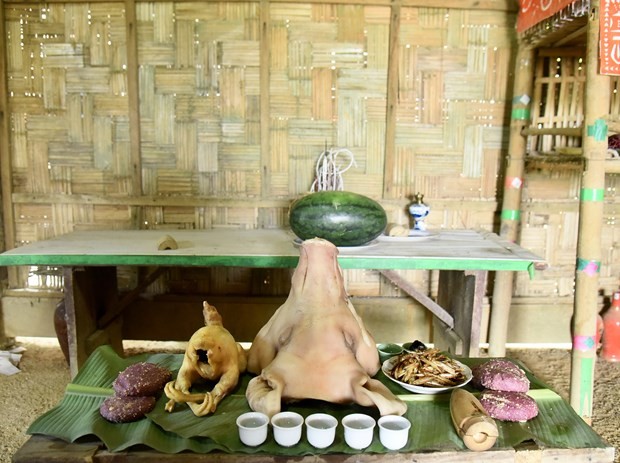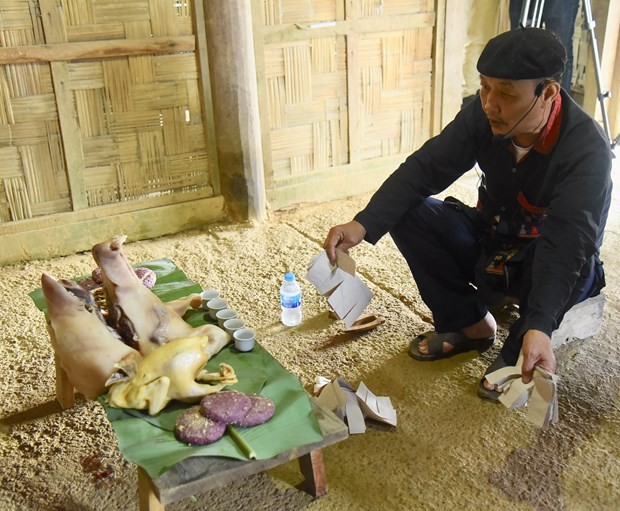(VOVWORLD) - Like many other ethnic groups, the Dao celebrate Thanh Minh, the Tomb Sweeping Festival, in the third lunar month. It’s one of the most important ceremonies of the year, along with the Lunar New Year and the Full-Moon ceremony in the seventh lunar month. Each branch of the Dao celebrates Thanh Minh differently, but in general descendants show their gratitude and filial piety to ancestors by repairing their graves and making offerings to them to pray for blessings and protection.
 The offering of the Dao ethnic group's Thanh Minh ceremony (Photo: Diem Quynh) The offering of the Dao ethnic group's Thanh Minh ceremony (Photo: Diem Quynh) |
Before the Thanh Minh ceremony, all families of the Dao Quan Chet (who live mainly in Tuyen Quang, Hoa Binh, and Vinh Phuc province) gather at their ancestral worship house. The head of the clan chooses a good day to hold the ceremony which doesn’t coincide with other important days of the family. He invites two shamans to perform the ritual.
Each family prepares offerings of liquor, pork, chicken, pounded rice cakes, and white and yellow votive papers, which represent cash and gold.
The Dao Quan Chet believe that, while the graves of ancestors who died thousands of years ago may have been lost, they still have to be worshiped. Because the descendents don’t know where those old graves are, when they perform the ritual, the shamans burn extra votive papers so the ancestors can hire ghosts to repair their graves.
The Thanh Minh ceremony is an all-soul day, so the more offerings, the better. Trinh Tien Xuan of Nga Hoang commune, Yen Lap district, Phu Tho province, said: “Thanh Minh worship is an opportunity for descendants to show their gratitude to the deceased. They should prepare as many shrimp and fish for the offering as possible. They catch shrimp and fish in ponds, lakes, and rivers, clean them, and prepare different dishes by frying, boiling, and grilling. After the ceremony, the family members enjoy the dishes.”
 The Dao offer white and yellow votive paper on a Thanh Minh ceremony. (photo: Diem Quynh) The Dao offer white and yellow votive paper on a Thanh Minh ceremony. (photo: Diem Quynh) |
The Dao Khau people in Sin Ho district, Lai Chau province, prepare for the Thanh Minh ceremony at the beginning of the third lunar month. The local men make votive paper offerings. They cut out paper flags of five colors, tie them to tree branches, and plant the branches on the graves. The local women distill liquor, steam sticky rice, and pound rice to make cakes.
On Thanh Minh day, family members bring hoes, shovels, and sickles to mow the lawn and clean the ancestral graves. They arrange the offerings on the graves and pray for their ancestors’ blessings. After the ritual, they go straight home and do not visit other people's houses.
No matter where people live and work, they try to return to their native village to attend the Thanh Minh ceremony.
Cheo Lieu Pao of Phang Xo Lin commune, Sin Ho district, said: “The third lunar month is the Grave Sweeping time of the Dao Khâu. These are happy days when people unite with their families and remember their ancestors with the greatest respect. Thanh Minh is a cultural value that the descendants will uphold forever.”
The white turbaned Dao Tien have a legend that their ancestors migrated very far from their native village. When their fathers died, they could not go back to mourn. So Dao Tien women wear a white turban headband all their life to mourn their fathers.
That’s the reason the white turbaned Dao Tien don’t hold a Thanh Minh ceremony at the cemetery like other Dao branches. Dr. Bàn Tuấn Năng of the Ho Chi Minh National Academy of Politics said that before a new crop, the white turbaned Dao Tien hold a ceremony to thank their ancestors and pray for their protection and blessings for a bountiful harvest and for all things to grow healthy.
“The Dao Tien do not visit ancestral graves. They worship at home, and their offering always includes red and black steamed sticky rice and white, flat, round glutinous rice dumplings, which convey their respects to the ancestors. After the Thanh Minh period, the weather always becomes more favorable for a new crop.”